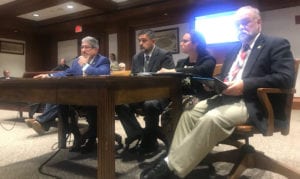Who is a member?
Our members are the local governments of Massachusetts and their elected and appointed leadership.

Fitchburg Mayor Stephen DiNatale, Fitchburg Public Works Commissioner Nicolas Bosonetto, MMA Legislative Analyst Ariela Lovett and Ludlow Public Works Director and Sturbridge Selectman Michael Suprenant testify at the Oct. 8 hearing of the Joint Committee on Transportation.
House Speaker Robert DeLeo announced on Nov. 14 that he would push back the timeline for a much-anticipated debate on additional resources for the state’s troubled transportation systems until next year.
DeLeo had previously indicated that the House would take up a substantial transportation revenue bill, yet to be filed, before the end of the formal legislative session on Nov. 20.
Public opinion surveys indicate that drivers and riders have been growing increasingly frustrated with roadway congestion and public transit breakdowns across the Commonwealth. In recent months, House leadership solicited policy proposals from a range of stakeholders to help shape a transportation revenue bill and explore whether compromises could be reached on various options. There is, however, widespread consensus that substantial investment, along with policy changes, are needed to reform the status quo.
The Massachusetts Business Coalition on Transportation, with the Greater Boston Chamber of Commerce as co-chair, announced its support for a gas tax increase of between five and 25 cents. The chamber itself supports a 15-cent gas tax increase, phased in over a three-year period. The state gas tax is currently 24 cents per gallon.
The Business Coalition also called for the creation of a 21st Century Roadway Pricing Taskforce, which would have one year to develop a plan to implement some form of congestion pricing in the Commonwealth.
Another super-coalition, comprised of municipal leaders from the Boston metro area, also supports a 15-cent increase in the gas tax. The Metropolitan Mayors Coalition, North Shore Coalition and Commuter Rail Communities Coalition is also calling for expanding tolling to additional highways and increasing fees for ride-hailing services.
The MMA has also participated in a Senate working group on transportation, which held meetings over the summer to discuss roadway congestion and regional approaches to transportation reform.
Speaking with reporters, Gov. Charlie Baker recently said he opposes a significant increase in the state gas tax, adding that the $18 billion transportation bond bill he filed proposes sweeping transportation system investments and reforms without raising taxes. The MMA testified on the governor’s bill before the Joint Committee on Transportation on Oct. 8, again calling for a Chapter 90 authorization of at least $300 million per year. The governor’s bill, which would maintain the Chapter 90 funding base at $200 million, where it has been since fiscal 2012, has not been reported out of committee.
Since announcing a 12-state and Washington, D.C., regional compact, the Transportation and Climate Initiative, last December, Massachusetts officials have been working on details of a proposal that would cap carbon emissions from gasoline and other transportation fuels. Revenue generated by the “cap and allowance” system would be invested by each state to fund transportation infrastructure and system needs. The various transportation coalitions all identified TCI as an important new initiative and source of revenues for transportation reform.